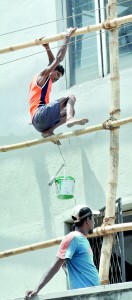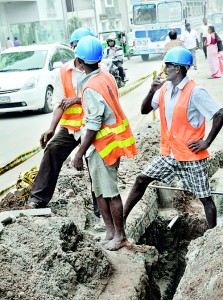News
Boom times paid for in blood
Stoked on cannabis to raise energy and endurance levels, labourers work barefoot and bareheaded on construction and industrial sites

Questions of safety: This worker has to balance both himself and the bucket of paint. Pix by Susantha Liyanawatte
where scores of deaths occur each year from the neglect of safety laws and the lack of resources to police industrial activity. As Sri Lanka sees a prolonged construction and industrial boom, the resources to ensure the safety of workers engaged on hundreds of sites around the country is well below the level required.
Labourer Susantha Pradeep Kumara, 23, was desperately struggling to hold up a leaning slab of cement on Tuesday when he lost his balance and fell headlong from the second storey of a building and died.
His skull and backbone were broken in the 40-foot fall. The young man, a contract labourer from Kuda Bollaththa, was buried on Friday at the Bollaththa Family Burial Grounds.
His was one of many deaths that have taken place at construction sites and factories around the country – last year, at least 30 people were killed on construction sites as building managers drive vulnerable workers, many on contract rates, to work in hazardous conditions. The actual toll is probably much higher, officials said.
Workers fall to their deaths from multi-storey buildings or are fatally injured while working unprotected on machinery, become deaf due to machine noise and vibration, suffer heat stress and strokes from toiling in extreme temperatures, and others fall sick or die while exposed to chemicals, tar or even – in the case of medical workers – radioactivity and microbial infections.
The Sunday Times found that use of cannabis is common among low-paid workers as an energy booster and some contractors also give their workers drugs to get them to work long hours. Speaking on condition of anonymity, a sub-contractor admitted to this paperthat some of the workers under him take drugs to help them through the working day, and that this practice was replicated at other sites.

Many workers say they are not insured against accidents
Our investigation into conditions on road and building construction sites around Colombo showed that despite the need to use protective gear some workers had bare feet or wore slippers and lacked face masks or helmets regardless of the fact that they were working with cutting machinery or exposed to dust, cement and tar.
About 65 per cent of the workforce of 8.7 million is employed in the informal sector where safety regulations are most commonly ignored, by employers and ignorant workers alike.
Some labourers admitted they had been provided with the necessary protective gear such as boots, gloves, face masks and helmets but that they used them only when they thought it was “necessary”.
D. Somapala, a 30-year-old labourer from Anuradhapura working on a road construction project along Duplication Road said, as a practice, he and others put on their boots and masks only when they worked with cement and tar because they found protective gear uncomfortable. To the Sunday Times it was apparent that these workers were generally heavily exposed to industrial dust and fumes.
At a construction site in Pettah where about six workers were involved in colour-washing a three-storiyed building there was bamboo scaffolding instead of the steel fabrications generally used for this purpose. The site had no safety nets. One of the workers, 43-year-old H. Piyarathne, a father of three, said he had been working for over eight years but he had never used safety nets as he considered them a hindrance to his work.
“We place total confidence in ourselves because without the safety nets we can be more flexible,” he said.
Asked if they were insured, workers claimed that their employer had given verbal assurances about insurance but on being further questioned, said they had not signed any insurance documents and had no knowledge of the details of their claimed cover. The Commissioner of the Industrial Safety Division of the Labour Department, W.L.S Wijeysundara, said the main causes of fatal accidents in the road construction sector were collapsed sites, a lack of proper precautions, use of low-quality equipment and the absence of a signalman during heavy vehicle movements.
Having a safety officer deployed at every construction site or factory is a mandatory requirement, she said, although this was often disregarded by minor contractors.
None of the sites visited by the Sunday Times had safety officers. The workers said visiting site supervisors advised them on such matters.
The Industrial Safety Division, the enforcing and implementing body of the Factory Ordinance of 1942 (the main health and safety legislation) has 31 inspecting engineers spread thinly across 10 regional offices in Anuradahapura, Badulla, Colombo, Galle, Gampaha, Jaffna, Kandy, Kurunaegala, Kalutara and Ratnapura tackling workplace safety, health and welfare issues by carrying out routine inspections of constructions sites and factories in addition to visiting sites following complaints received.
In 2013, there were 71 fatal and 1344 non-fatal accidents islandwide, Commissioner Wijeysundara said. Thirty of the fatalities were from construction sites and the rest from factories etc.
The true statistics could be much higher, she said, as there was significant under-reporting of accidents.
Additional reporting by C. S.
| Many casualties go unreported The National Health and Safety Policy, launched on July 16, aims to fill the gaps identified by the National Institute of Occupational Safety and Health (NIOH) in surveillance, awareness and capacity-building of workplace safety.
NIOH Director-General Dr. Champika Amarasinghe said that although the Factories Ordinance of 1942 No.45 has a mandatory requirement that all occupational accidents and diseases are reported to the Labour Department, a significant number of these cases go unreported. Up to 2013, a negligible number of occupational diseases were reported. The responsibilities of the NIOH, established in 2005, include occupational health and safety policy development and timely review, advice, consultancy, training and seminars for employers and employees, risk assessments, safety audits, biological and environmental monitoring etc. |

